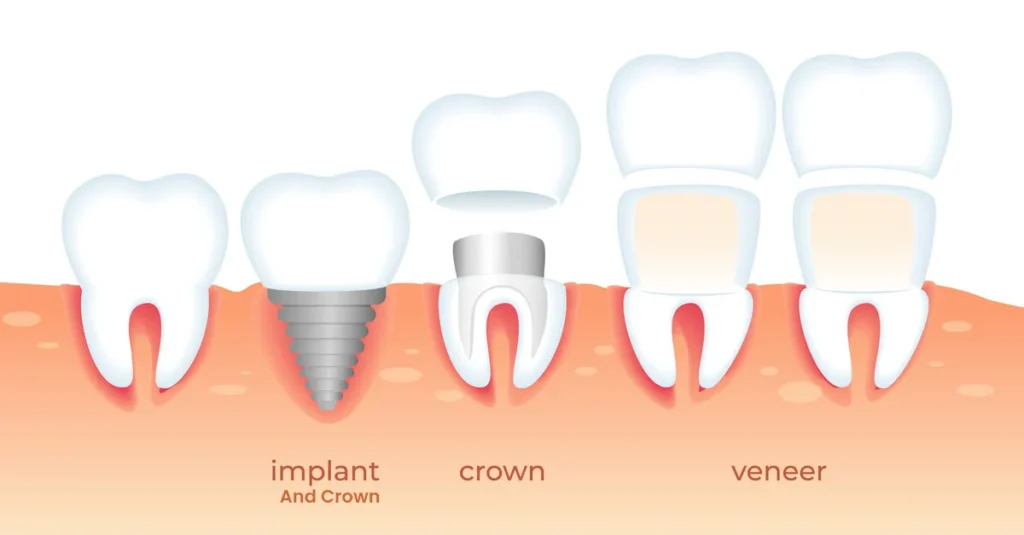Do you dream of achieving a perfect, dazzling smile? Look no further than the transformative wonders of veneers! When it comes to enhancing your teeth, veneers have gained immense popularity in the realm of cosmetic dentistry. In this comprehensive guide, we will delve into the technique of shaved teeth for veneers, exploring its significance, procedure, and key considerations to ensure the smile of your dreams becomes a reality.
What are Veneers?
Cosmetic veneers are custom-made structures designed to cover the front surface of teeth, effectively addressing issues like discoloration, fractures, cracks, or gaps between teeth, enhancing the appearance of smiles. They mimic the natural appearance of teeth. Veneers serve various purposes, including;
- Concealing cracks and stains on teeth.
- Closing gaps between teeth in genetic conditions, such as diastema.
- Altering tooth size, length, shape, and color to create an aesthetically pleasing smile line.
However, they may not be suitable for severe jaw irregularities, severely misaligned teeth, or irreparable fractured teeth. Alternative options, such as orthognathic jaw surgery, exist for these cases.

His After Photo

Only His Before And After Photo
Table of contents
- What are Veneers?
- How Many Types of Veneers Are There?
- Do You Have to Shave Your Teeth for Veneers?
- How Does the Process Work When Veneers?
- How Much Are Veneers Prices?
- How Much Are Veneers Prices in Turkey?
- Before and After Veneers
- Embrace Life with Confidence at Dentallaid – Premier Dental Clinic and Implant Center in Turkey
- FAQ
Benefits of Veneers
Veneers offer several benefits that have made them a sought-after treatment in cosmetic dentistry:
- Aesthetics: Veneers can dramatically improve the appearance of your smile by enhancing the color, shape, and alignment of your teeth.
- Customizability: Each veneer is custom-made to match your natural teeth, ensuring a seamless and natural-looking result.
- Durability: Veneers are crafted from strong materials that can withstand daily wear and tear, providing long-lasting results.
- Stain Resistance: Porcelain veneers are highly resistant to stains, allowing you to maintain a bright smile even after consuming stain-causing foods and beverages.
How Many Types of Veneers Are There?
If veneers seem like the right choice for you, there are two primary options available;
- Porcelain veneers
- Composite resin veneers
Both types serve the same purpose, yet each material comes with its own set of advantages and disadvantages.
Read More: Veneers vs Crowns: What’s the Difference?
Porcelain Veneers
Porcelain veneers are renowned for their natural appearance and durability. This procedure involves delicately shaving off a 0.5mm portion of the tooth’s surface to ensure a perfect fit for the veneer. Typically, they deliver exceptional aesthetic results and predict longevity in treatment. While professionally concealing issues like stains or gaps, they blend seamlessly with natural teeth, creating an aesthetically pleasing cosmetic enhancement.
Read More: Zirconia Dental Crowns -Cost, Process and Is It Safe?
Composite Resin Veneers
Alternatively, veneers shaved teeth using composite resin involve minimal alteration to the tooth surface, approximately 0.02mm, making them a conservative option compared to porcelain veneers. While they are cost-effective, their durability is slightly lower than that of porcelain veneers.
These veneers are an alternative to shaved teeth for veneers using porcelain. They offer a more budget-friendly solution. However, while porcelain veneers ensure superior aesthetics and a predictable treatment lifespan, composite veneers are chosen for their conservative approach despite somewhat reduced longevity.
Read More: Permanent Dental Veneers: The 8 Most Important Points to Know
Do You Have to Shave Your Teeth for Veneers?
No-prep options are emerging as potential alternatives that aim to minimize or eliminate the need for shaving enamel off teeth. However, the effectiveness of these treatments varies from person to person. A comprehensive examination of your teeth is essential to determine whether these no-prep solutions are suitable for you.
Moreover, there are advancements in veneer technologies known as minimal prep, such as lumineers, which require considerably less preparation before placing the veneers. These innovative techniques allow for a less invasive application of veneers onto your teeth.
Nevertheless, there are circumstances where shaving teeth becomes necessary to prepare them for veneers. This could be due to specific tooth damage that prevents the use of no-prep treatments or certain underlying conditions. If the need arises to shave your teeth for veneer preparation, it’s important to note that only a minimal amount of enamel is removed.
How Does the Process Work When Veneers?
Dental veneers are an exciting aspect of cosmetic dentistry, planned treatments that offer enthusiasm for the patient. However, understanding the procedure and having questions addressed beforehand is crucial for both treatment efficacy and the patient’s peace of mind before undergoing dental procedures.
Preliminary Consultation About Your Dental Treatments

Your journey begins by visiting our clinic, where we engage in a comprehensive consultation. During this session, we discuss your goals and expectations, evaluate your dental health through intraoral X-rays and a visual examination, and thoroughly explain the treatment procedure.
Teeth To Be Shaved For Veneers
Subsequently, to ready the tooth surface for veneer application, a precise amount of enamel is delicately shaved off, tailored to the treatment plan and tooth condition. (If Lumineer treatment is not planned.) Also, this procedure is conducted under local anesthesia, ensuring the patient’s comfort without experiencing any pain.
Impressions
After any necessary treatments for shaved teeth for veneers, precise measurements of your teeth are taken using specialized dental tools. These measurements are crucial for preparing the veneers and crafting the smile line. They ensure a personalized design of the teeth, shaping and matching the color tone to achieve a natural and authentic appearance.
Placement
When your veneers are ready and during the fitting phase, if the tooth color matches your satisfaction, the veneers will be bonded using a specialized adhesive. Throughout this treatment process, spanning an average of 7 – 10 days, the individual’s eye and skin color play a crucial role in determining the planned smile line.
As a result, your only responsibility after treatment will be the post-treatment care of your veneers and shaved teeth, which is a cosmetic enhancement that requires minimal maintenance. It’s crucial to attend our clinic for routine check-ups every six months on average. With proper upkeep, you can enjoy years of eating, smiling, and relishing the beauty of your new teeth.
In this regard, adhering to good oral hygiene practices, including dental examinations and cleaning, and brushing your teeth at least twice a day or more, is essential.
Read More: Which Problems Do Smile Design Eliminate?
How Much Are Veneers Prices?
An important query often discussed among individuals is the cost of porcelain veneers and composite resin veneers. Prices for these treatments vary in Canada, America, the United Kingdom, Australia, and New Zealand as follows;
| Countries | Porcelain Veneers (Per Psc.) | Composite Resin Veneers (Per Psc.) |
| United State Of America | $925 to $2,500 | $400 – $1,500 |
| United Kingdom | $825 – $1,206 | $350 – $1,000 |
| Northern Ireland | $755 – $1,000 | $600 – $850 |
| Ireland | $600 – $1,100 | $500 – $750 |
| New Zeland | $1,850 – $2,350 | $650- $1500 |
| Australia | $500 – $1,000 | $300 – $600 |
| Canada | $592 – $1,852 | $300– $500 |
How Much Are Veneers Prices in Turkey?
Our clinic is located in Turkey. Veneers prices might offer more affordability in our country. The table below displays the veneers covered by an approximately 5-year warranty available at our clinic. Prices for these treatments in our clinic as follows;
Explore Our Work: Dental Tourism in Istanbul
| INCLUDED | GBP | EURO | DOLLAR |
| VIP Transfer Services | Inclusive | ||
| Consultation | Inclusive | ||
| Panoramic X-Ray | Inclusive | ||
| Periapical X-Ray | Inclusive | ||
| Local Anaesthesia | Inclusive | ||
| Medicine & Ice pack | Inclusive | ||
| DENTAL VENEERS PRICE IN TURKEY (For Per Teeth) | |||
| Teeth Whitening for Dental Veneers cost in Turkey | 150£ | 180€ | 200$ |
| Zirconium Veneer for Dental Veneers cost in Turkey | 110£ | 120€ | 135$ |
| Porcelain (Emax) Veneer for Dental Veneers cost in Turkey | 170£ | 180€ | 200$ |
| Porcelain (Laminate) Veneer for Dental Veneers cost in Turkey | 180£ | 190€ | 215$ |
Check Out Real Reviews: Dental Clinic in Istanbul | Check Out Real Reviews on Trustpillot
Before and After Veneers
Reviewing dental veneers before and after images showcasing individuals who have undergone veneer procedures can offer valuable insights into the transformative effects. Visit our website or check our Instagram page to explore before and after photos of the dental veneer procedures performed at our clinic, providing detailed information about these treatments.
Read More: Check out more of our Before and After Works
Embrace Life with Confidence at Dentallaid – Premier Dental Clinic and Implant Center in Turkey
At Dentallaid, we place utmost importance on comprehensive consultations tailored specifically to your shaved teeth for veneers treatment. Our seasoned team is dedicated to guiding you through every step, discussing pricing transparently, and assisting you in achieving the radiant smile you desire. Ready to transform your smile? Click any button below to discover in-depth details about our exceptional dental veneers treatments!
FAQ
Shaved veneers can last anywhere from 4 to 24 years, contingent upon the type you opt for and the maintenance regimen. Although shaving teeth for veneers is a requisite, the veneers effectively conceal any signs of potential dental damage.
Usually, dentists remove about 0.5mm of enamel for traditional porcelain veneers and slightly less for composite veneers. Also, this process permanently reduces enamel, as it cannot be replaced.
Underneath veneers, natural teeth might appear slightly smaller as a result of a thin layer of enamel removal, facilitating comfortable placement of some veneers.
Veneers and their bonding material don’t pose any damage to natural teeth. They’re a conservative option for enhancing your smile’s natural beauty, offering a preferable alternative to more invasive treatments like crowns.


